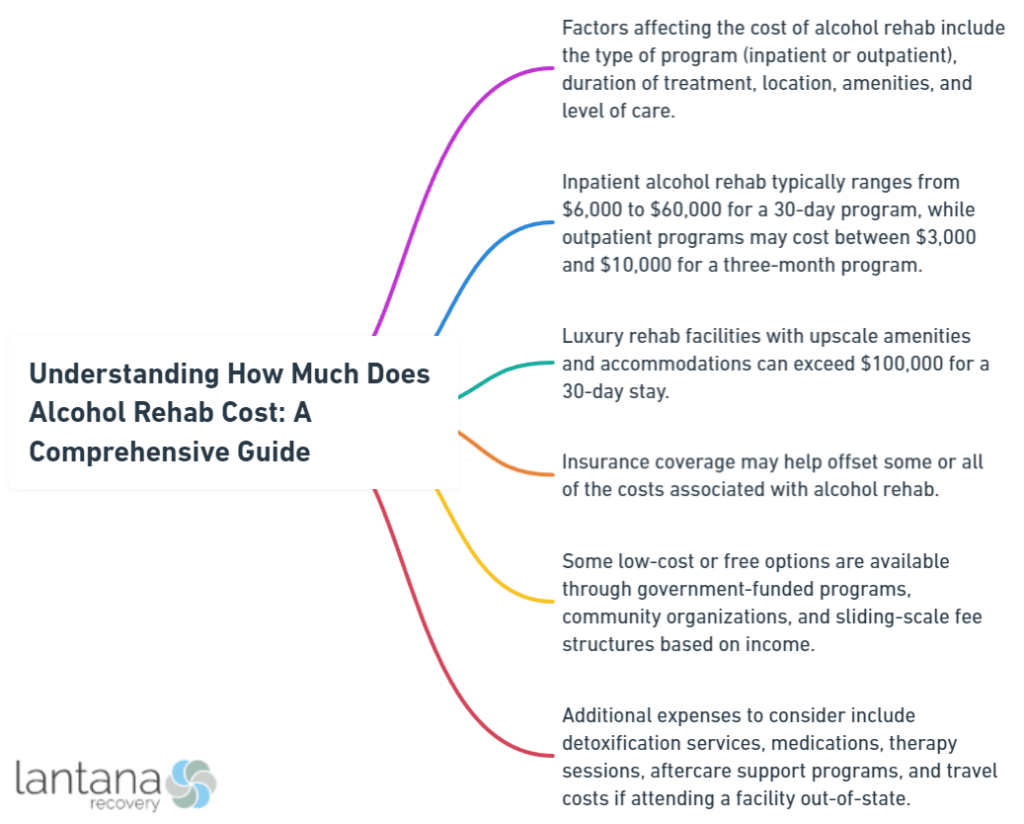Wondering ‘how much does alcohol rehab cost?’ Rehabilitation costs vary with outpatient programs potentially starting around $1,400. Inpatient care can reach $80,000, influenced by treatment types and facility amenities. This guide will help you understand these cost elements, preparing you for the financial considerations on your recovery journey.
Key Takeaways
- The cost of alcohol rehab varies based on location, type of program, and insurance, with residential treatment ranging from $5,000 to $80,000 and outpatient programs from $1,400 to $10,000 for a standard 30-day cycle.
- Insurance can significantly mitigate alcohol rehab costs under the Affordable Care Act, but coverage levels vary and additional out-of-pocket expenses such as deductibles and copayments may apply.
- Alternative financing options like payment plans, grants, and scholarships are available for alcohol rehab, in addition to state-funded and non-profit programs offering reduced-cost or free treatment.
Breaking Down the Cost of Alcohol Rehab
As you consider your path to overcoming alcohol addiction, remember to consider the financial commitment involved in seeking addiction treatment. The cost of rehab is as diverse as the experiences of those who walk through a rehab center’s doors. Factors influencing the price tag include the treatment center’s location, the type of program, and insurance coverage. Some may find solace in knowing that states like Arkansas, Idaho, and South Dakota offer some of the most affordable residential treatment services, while others face higher expenses in locales such as Iowa, Vermont, and North Dakota.
One must weigh the immediate financial outlay against the long-term benefits of health and happiness that recovery promises.

Alcohol Rehab South Carolina
Alcohol rehab in South Carolina offers individuals struggling with alcohol addiction a range of comprehensive treatment options tailored to their needs. With a focus on holistic healing and evidence-based practices, these facilities provide a supportive environment for individuals to address their addiction and embark on the path to recovery. From medically supervised detoxification to therapy sessions and aftercare planning, alcohol rehab centers in South Carolina prioritize the well-being and long-term sobriety of their clients. The state’s picturesque landscapes and serene surroundings often serve as conducive settings for healing and self-reflection during the rehabilitation process. Moreover, many programs integrate various therapeutic modalities, such as cognitive-behavioral therapy and group counseling, to address the underlying causes of addiction and foster lasting behavioral changes. Seeking alcohol rehab in South Carolina can be the crucial first step towards reclaiming a healthier, happier life free from the grip of addiction.
Types of Alcohol Treatment Programs

The road to recovery is paved with various treatment options, each carrying its own price tag. Residential treatment programs, the bastions of intensive care, can range dramatically from $5,000 to a staggering $80,000. These figures fluctuate based on the quality of the facility and the depth of the programs offered.
Those seeking a less restrictive approach will find outpatient programs more financially palatable, with the cost of drug treatment ranging between $1,400 to $10,000 for a standard 30-day cycle, depending on the facility and services provided. Beyond the cost, the crucial aspect is to find a treatment path that suits both your recovery and financial requirements.
Length of Alcohol Rehab Program

Time is a significant factor in the healing process, and the length of your alcohol rehab program directly affects the cost. Here are some typical durations and their associated costs:
- 28-30 day inpatient rehab program: can vary considerably in price
- Short-term residential treatments: last 3-6 weeks
- Long-term care: can span from 6-12 months
- Extended programs of 60 to 90 days: often ranging from $12,000 to $60,000
The longer the stay, the more you can expect the cost to climb.
Yet, more time investment often results in stronger outcomes, given the importance of continuous care from detox through aftercare for successful recovery.
Additional Services and Amenities
While the foundation of any rehab program lies in its treatment efficacy, the additional services and amenities can tip the financial scales. For those seeking the zenith of comfort and luxury, amenities such as massages, acupuncture, and even tennis courts can elevate the cost of a program significantly. Such luxuries at high-end facilities can see monthly costs skyrocket to anywhere between $17,400 and $100,000.
Beyond the opulent extras, holistic services and state-of-the-art amenities can also add considerable amounts to the bill. Even the act of entering a program comes with its price, as some centers charge an admission fee, potentially adding $3,000 to $4,000 to the initial costs.
Alcohol Rehab Centers in South Carolina
When seeking assistance for alcohol addiction, individuals have access to alcohol rehab centers in South Carolina. These centers offer comprehensive programs tailored to address the specific needs of each individual battling alcohol dependency. Through a combination of therapy, medical intervention, and support groups, these facilities aim to help patients achieve sobriety and maintain it in the long term. Whether it’s outpatient or inpatient treatment, individuals can find the level of care that suits their situation best. With a focus on holistic healing and personalized treatment plans, alcohol rehab centers in South Carolina strive to empower individuals on their journey to recovery.
Understanding Inpatient vs. Outpatient Costs

The decision between inpatient and outpatient care is not only a matter of treatment preference but also one of financial consideration. On average, inpatient care rings in at about $575 per day at a private facility, while outpatient programs offer a more affordable route, with three-month programs ranging from $5,000 to $10,000. These figures highlight the divergent paths one can take, both clinically and financially.
Inpatient treatment often includes a more comprehensive package of services, while outpatient programs provide flexibility and affordability.
Inpatient Treatment Expenses
Inpatient rehab is the more intensive option, often necessitating a higher financial commitment. Drug rehab cost can span from $3,000 to $10,000 for a month’s worth of treatment, with the higher end of the spectrum attributed to centers renowned for their comprehensive care.
The average expense for adult residential treatment falls between $4,008 and $15,524, a reflection of the intensive support, housing, and tailored treatment plans that inpatient programs provide. It’s the price paid for a structured environment designed for those with severe addictions or who need a respite from their daily triggers.
Outpatient Treatment Affordability
Outpatient rehab is often celebrated for its cost-effectiveness, with the ability to dip as low as $1,400 for a three-month program. Intensive Outpatient Programs (IOPs) typically cost between $250 to $350 per day, while partial hospitalization may range from $350 to $450 per day at a private care facility. The duration of IOP treatment usually spans 12 to 16 weeks, focusing on group therapy alongside individual and family sessions.
For those seeking a more modest approach, standard outpatient therapy is generally the least expensive option, hovering around $200 per week. The final cost hinges on how frequently you visit and the length of the program.
The Role of Insurance in Alcohol Rehab Costs

Insurance is a beacon of hope for many navigating the high seas of alcohol rehab costs. Under the Affordable Care Act, insurance carriers are mandated to cover some or all substance use disorder services, including alcohol rehab. The depth of this coverage, however, can vary as widely as the policies themselves. From the range of mental health treatment services to the rehab treatment provider chosen, the extent of insurance coverage and the patient’s resulting out-of-pocket expenses depend on the individual’s policy and unique needs.
Grasping this coverage is a key step in preventing financial obstacles from impeding the journey to recovery.
Navigating Insurance Coverage
Understanding the nuances of insurance coverage can make all the difference in managing rehab costs. Here are some key points to consider:
- Health Maintenance Organizations (HMOs) offer coverage within a contracted network at fixed fees.
- Preferred Provider Organizations (PPOs) typically allow more freedom in choosing providers without a referral.
- The Affordable Care Act has been a game-changer, ensuring those with substance use disorders are not denied access to health insurance and are provided with coverage for addiction treatment.
Medicare and Medicaid also play their parts, with Part A covering hospitalization and Part B covering outpatient services for substance abuse treatment. Life events like changes in family size or loss of health coverage can affect your insurance plans, potentially altering the scope of alcohol rehab coverage.
When Insurance Falls Short
Insurance coverage for alcohol rehab is not always a panacea; there may be gaps. Patients are likely to face additional out-of-pocket costs like deductibles, copayments, and coinsurance. Choosing in-network providers can result in lower expenses due to negotiated rates with insurance companies, while out-of-network providers may lead to steep costs not covered by insurance. Therefore, it is imperative for those seeking alcohol rehab to fully understand their insurance plan, including the fine print detailing what costs are covered and what expenses they will be shouldering themselves.
If insurance coverage falls short, it’s necessary to explore alternative solutions, like payment plans or assistance programs, to manage alcohol rehab costs.
Alternative Financing for Alcohol Rehab
When insurance doesn’t cover all the bases, alternative financing options for alcohol rehab can step up to the plate. Some rehab centers have established partnerships with specialized teams to offer financing options that cater to individuals with various income and credit backgrounds. Loans and tailored payment plans are also on the table, providing a helping hand to patients as they navigate the financial aspects of treatment.
Payment solutions and even free rehab programs are accessible for those without insurance, though they may have waiting lists. It’s a landscape that requires careful navigation, as families often grapple with the financial burden of rehab programs and therapy, especially when not covered by health insurance.
Payment Plans and Sliding Scales
To make treatment more accessible, some alcohol rehab centers offer payment plans tailored to fit the financial realities of individuals paying out-of-pocket for rehab services. These plans are structured to align with the individual’s income, ensuring that the cost of recovery does not become a barrier to accessing essential care. Providers like American Addiction Centers may offer financing and payment plans suited to the individual’s financial circumstances, making the daunting prospect of rehab costs more manageable.
Grants and Scholarships
In the midst of the financial struggle of addiction treatment, grants and scholarships surface as rays of hope, providing partial or full funding for those in need. The National Institute of Health provides grants for specific substance abuse treatments, such as those for cocaine addiction, for qualifying individuals. The Center for Substance Abuse Treatment by SAMHSA specializes in grants for substance abuse treatment for specific demographics, such as teens and pregnant women.
Scholarships for rehab are awarded based on individual cases and can be used in conjunction with insurance plans for added support. Non-profit organizations like 10,000 Beds offer scholarships that cover the full amount of rehab costs for patients in dire need.
Seeking Affordable Treatment Options
Achieving sobriety doesn’t necessarily mean a financial burden. State-funded and non-profit programs present affordable treatment options, providing reduced-cost or free substance abuse treatment for those in need. These programs provide a ray of hope for individuals grappling with the costs of addiction treatment, ensuring that financial constraints do not stand in the way of recovery.
State-Funded and Non-Profit Programs
State-funded drug rehab programs are a lifeline for many, providing drug and alcohol rehab at reduced costs or even for free, thanks to state taxes or federal block grants. Not to be overlooked, non-profit rehab centers operate by reinvesting revenue back into their substance abuse treatment, thus offering affordable care without compromising on quality. Medicare and Medicaid recipients have state-funded options at their disposal, and for those lacking insurance coverage, state-funded rehab options can provide a safety net.
Organizations like Zinnia Health play a pivotal role in connecting individuals with state-funded detox and treatment facilities, catering to those who cannot afford treatment otherwise. Moreover, free support is available through:
- rehab centers
- churches
- charities
- non-profits
This includes free sober living housing for low-income individuals.
Evaluating Low-Cost Providers
When assessing low-cost providers, one must look further than just the price tags. It’s about checking for:
- accreditation
- licensing
- membership in professional organizations
- staff qualifications
to ensure the provider is credible and offers quality treatment. Evidence-based therapies like MAT, CBT, and DBT should be part of the treatment arsenal, especially for those with co-occurring disorders, to promote sustainable recovery.
Non-profit rehab centers often provide high-quality care with experienced staff and a full continuum of services, making them an excellent choice for those seeking affordability without compromising on treatment efficacy. When considering low-cost addiction treatment providers, success rates and the breadth of services should also factor into the decision, and a rehab center with these qualities can be a great option.
Alcohol Rehab Services Near Me
If you’re seeking alcohol rehab services near me, it’s crucial to prioritize finding the right support system for your journey to recovery. Begin by researching local facilities or treatment centers that specialize in alcohol addiction treatment. Consider factors such as their treatment approach, staff expertise, and available resources. It’s also essential to assess your own needs and preferences to ensure the program aligns with your goals. Don’t hesitate to reach out to these facilities directly to inquire about their services, intake process, and any other questions you may have. Remember, taking this step towards seeking help is a commendable and courageous decision on your path to wellness.
Impact of Alcohol Addiction on Finances
The financial repercussions of alcohol addiction extend far beyond the individual, impacting their family and the wider society. In industrialized countries, the economic costs of alcohol use can take up several percent of the GDP, signifying a substantial financial burden. The loss of productivity, workplace accidents linked to alcohol, and the subsequent strain on employees, employers, and social security systems are just the tip of the iceberg.
Unemployment, increased healthcare needs, and long-term economic disadvantages for children in affected families underscore the pervasive financial impact of drug or alcohol addiction, alcohol abuse, drug addiction, and drug abuse.
Accessing Resources and Support
Nobody grappling with alcohol addiction should feel isolated or devoid of options. Organizations like Zinnia Health stand ready to assist with flexible payment options, financing plans, and guidance on treatment options covered by insurance. Their dedication to assist individuals in seeking treatment promptly, irrespective of financial situations, highlights the necessity of putting essential care first.
With access to a variety of treatment forms and support for admissions and relapse prevention, Zinnia Health is a valuable ally in the quest for recovery. Their 24/7 helpline ensures that questions about treatment programs, insurance coverage, and grants are answered, paving the way for those in need to seek help.
Summary
As we draw this guide to a close, remember that the cost of addiction treatment can be as complex and individualized as the journey to recovery itself. We’ve explored the myriad of factors that contribute to the overall expense—from treatment types and program lengths to luxurious amenities and the significant role of insurance coverage. While the financial aspect of rehab may seem daunting, there is an array of resources, support systems, and alternative financing options available to ease the burden. Affordable and even free treatment possibilities exist to ensure that financial constraints do not deter anyone from seeking the help they need. Embrace the knowledge that investing in alcohol rehab is a profound step toward a healthier, more stable future, not just for the individual in recovery but for their loved ones and society as a whole.
Frequently Asked Questions
What is the most popular program for recovering alcoholics?
The most popular program for recovering alcoholics is the 12-Step model, which is widely recommended and used for addiction treatment. It is a commonly recognized and effective support system for individuals seeking recovery.
What are the main factors that affect the cost of alcohol rehab?
The cost of alcohol rehab is affected by factors such as the type of treatment program, length of the program, additional services, location of the rehab center, and insurance coverage. These factors can significantly impact the overall cost of rehab.
How do insurance plans typically cover alcohol rehab costs?
Insurance plans mandated by the Affordable Care Act are required to cover some or all substance use disorder services, including alcohol rehab. The coverage extent and out-of-pocket expenses depend on the policy, treatment provider, and individual’s needs.
Are there any affordable options for alcohol rehab?
Yes, there are affordable options for alcohol rehab, such as state-funded programs, non-profit rehab centers, and payment plans based on income. These options aim to make treatment more accessible for those in need.
What should I do if my insurance doesn’t fully cover rehab costs?
You can explore alternative financing options like loans, payment plans, grants, and scholarships if your insurance doesn’t fully cover rehab costs. Additionally, assessing low-cost providers and seeking financial assistance from non-profit organizations are viable options.









